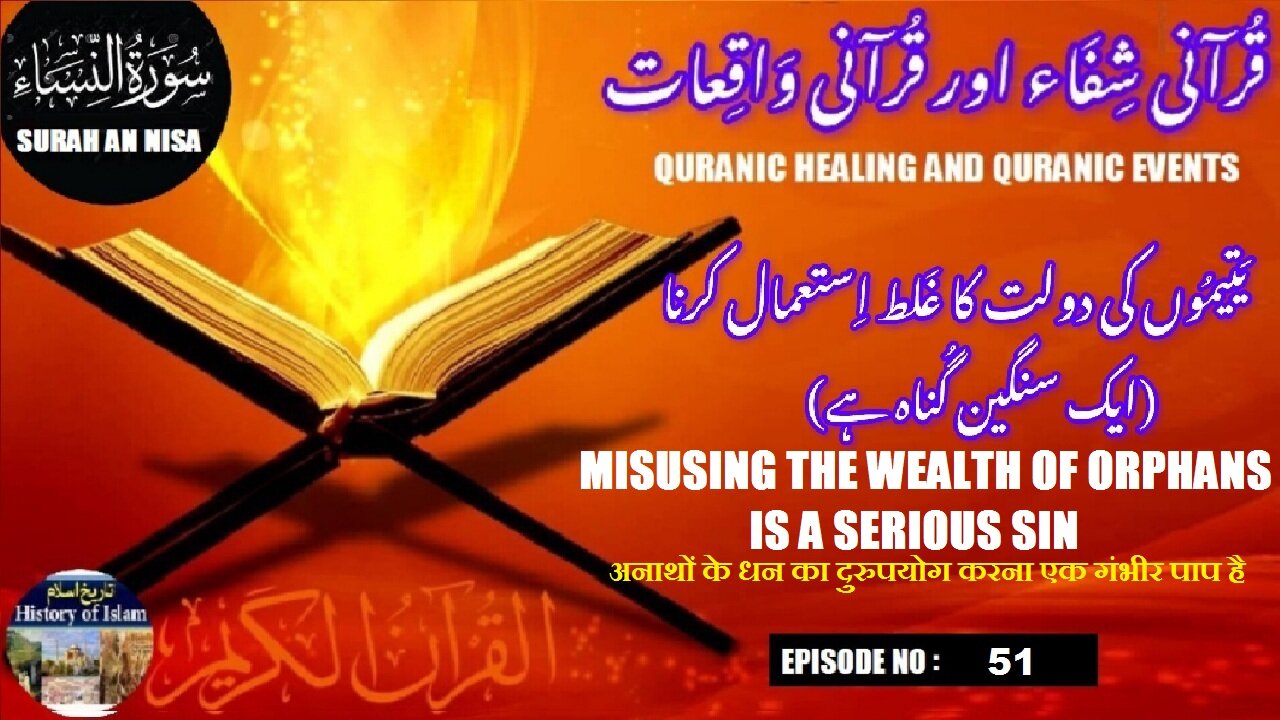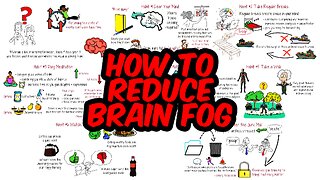Premium Only Content

Misusing the wealth of orphans is a serious sin | یتیموں کے مال کا ناجائز استعمال کرنا سخت گناہ ہے
@islamichistory813 #grave #sin #misusing #orphans #wealth #healing #and #events #from #the #quran #historical #stories #and #events #quranicstories #selfhealing #success #stories #striking #events #in #history #quranstories #babies #islamic #storiesfromthequran #religious #creation #stories #trending #quran #short #historical #loves #historical #heroes #what #is #true #strength #calm #quran #recitation #for #healing
A Grave Sin: Misusing Orphans’ Wealth | Quranic Command (4:2) Explained
Assalamu Alaikum, wa Rahmatullahi wa Barakatuhu.
Brothers, sisters, friends and elders, we are presenting the 51th episode of the Islamic informative video based on healing and events from the Holy Quran, and in this episode we will describe, A Grave Sin: Misusing Orphans’ Wealth | Quranic Command (4:2) Explained
Quranic Treatment of Women and Orphans: Do Not Exchange Bad Goods for Good (Surah An-Nisa 4:2)
The Holy Quran, as a complete code of life, addresses not only the spiritual needs of believers but also the social and ethical framework necessary to build a just and compassionate society. One of the core themes throughout the Quran is the protection of the weak, particularly women and orphans, who have historically been among the most vulnerable members of society. Surah An-Nisa (The Women) is a chapter that focuses extensively on social justice, family laws, and ethical conduct—especially regarding the treatment of women and orphans. Among its most profound instructions is the command: *“And do not exchange the bad for the good, nor consume their wealth into your own. Surely, it is a great sin.”* (Surah An-Nisa 4:2). This powerful verse outlines a critical ethical principle and reveals how Islam reformed corrupt practices related to the misappropriation of orphan and women’s rights, especially regarding wealth and property.
In pre-Islamic Arabia, orphans were often seen as a burden, and it was common for guardians to take control of their inheritance and wealth with little accountability. Women, too, were denied rights to property and often treated as assets rather than individuals with legal and moral status. Islam abolished these unjust customs and re-established dignity, protection, and equality for these groups through divine revelation. This verse, in particular, condemns the dishonest practice of replacing valuable assets that belong to orphans with inferior items owned by the guardians. The phrase *“do not exchange the bad for the good”* directly targets a type of fraud where someone would substitute the orphan’s high-quality possessions with cheaper, less valuable alternatives, thereby cheating the orphan and profiting dishonestly.
This act is not simply considered unethical—it is labeled a **“great sin”** in the eyes of Allah. By using strong moral language, the Quran not only identifies the wrongdoing but impresses upon the believer the seriousness of such behavior. The command reinforces that misusing the property of the weak and vulnerable, especially orphans, is not a trivial matter but a grave offense that attracts severe consequences in this world and the hereafter. This verse also functions as a legal boundary, setting clear guidelines for those in positions of trust. Guardians are not allowed to treat the wealth of orphans as if it were their own, nor are they allowed to mix it with their own finances in a way that could result in loss, confusion, or exploitation.
Moreover, the broader message of this verse fits into a larger Quranic vision of **justice, honesty, and moral accountability**. The Quran holds every believer responsible not only for their personal piety but also for how they treat others, particularly those who are weaker and less able to defend their rights. Women and orphans are repeatedly mentioned in this context, indicating Islam's deep concern for their protection and well-being. Women, who were once deprived of inheritance, were given specified shares in the Quran, and their financial and social rights were preserved through clear commands. Likewise, orphans were no longer seen as helpless dependents but as individuals whose wealth, dignity, and future had to be guarded with the utmost care.
By instructing believers not to swap inferior goods for superior ones, the Quran teaches a broader lesson: **honesty in all dealings**, especially when in a position of power over someone else's resources. This principle applies not just to guardians of orphans, but to leaders, employers, judges, and anyone entrusted with responsibility. The value of trust (amanah) is central to Islamic ethics, and breaking that trust, particularly when dealing with the vulnerable, is an act that corrupts society and distances a person from divine mercy.
The command also promotes **internal moral discipline**, reminding believers that Allah is ever-watchful and aware of every action, even those done in secret or behind closed doors. A guardian may be able to deceive others, but they cannot deceive Allah. This spiritual consciousness is a unique feature of Quranic ethics—it links morality to faith, reminding the believer that every action will be judged by the One who sees all. This awareness encourages self-restraint, sincerity, and righteousness in both public and private dealings.
In addition, this verse lays the foundation for **legal reforms** that took place during the early Islamic period. It established accountability mechanisms for guardianship and wealth management, especially in cases involving minors and women. Islamic scholars later expanded on these principles to develop Islamic inheritance law (faraid), rules for endowments (waqf), and guidelines for guardianship (wilayah), ensuring that the rights of the vulnerable would be protected through a system rooted in both divine instruction and practical governance.
In conclusion, Surah An-Nisa (4:2) offers a timeless command that reflects Islam’s deep commitment to justice, honesty, and the protection of society’s most vulnerable members. By forbidding the dishonest exchange of bad goods for good and the unjust consumption of orphan wealth, the Quran calls believers to uphold integrity in every sphere of life. This verse serves as a moral compass for individuals and communities, reminding them that trust is sacred, and justice is the foundation of faith. Through such verses, Islam establishes a framework not just for worship, but for a just, compassionate, and ethical society.
With this, we ask for your permission until tomorrow and pray to Allah Almighty to grant us the ability to act on the Quran and Hadith, Amen
Allah Hafiz
============================
-
 6:36
6:36
ISLAMIC HISTORY
1 day agoMuslim Heritage and Islamic Scholars introductory مسلم ورثہ اور اسلامی اسکالرز کا تعارف
2 -
 LIVE
LIVE
The Bubba Army
21 hours agoNick Hogan Sues Bubba to BLOCK the DOC - Bubba the Love Sponge® Show | 9/03/25
6,704 watching -
 8:01
8:01
MattMorseTV
12 hours ago $10.19 earnedHe's ACTUALLY doing it...
70.5K58 -
 33:25
33:25
Uncommon Sense In Current Times
15 hours ago $1.80 earnedHollywood’s Woke Agenda Exposed | Kevin Sorbo on Cancel Culture, Faith & the Common Sense Revolution
18K -
 8:23
8:23
The Art of Improvement
19 hours ago $0.46 earned7 Smart Habits to Boost Mental Clarity
2.37K2 -
 12:09
12:09
China Uncensored
10 hours agoI Have NEVER Been More Furious
3.98K14 -
 2:12
2:12
WildCreatures
4 days ago $0.83 earnedThe beauty and mystery of the Pantanal, Brazil's best secret
4.17K2 -
 9:38
9:38
Millionaire Mentor
18 hours agoBernie Sanders LOSES IT After Scott Bessent’s Shocking Comeback
3.55K8 -
 1:35:35
1:35:35
Dialogue works
1 day ago $0.54 earnedLarry C. Johnson & Paul Craig Roberts: Trump’s Plan COLLAPSES as Russia Strikes — Xi & Modi Rise!
2.87K3 -
 14:09
14:09
Zoufry
2 days agoThe Hunt for The Biggest Art Thief in US History
6.98K3